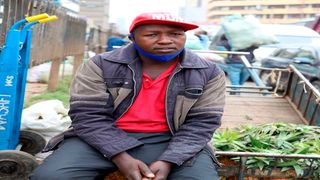
Dennis Mumo Kivuva, a pineapples trader in Muthurwa, Nairobi.
| Jeff Angote | Nation Media GroupNews
Premium
High fuel prices, taxes top Kenyans’ concerns
What you need to know:
- Other concerns Kenyans raised include high tax of importing different types of products and double taxation for traders who operate in more than one county.
- A majority of the estimated 6,000 traders who operate at Kamukunji Market in Nairobi are now surviving on reduced earnings.
Mr Dennis Mumo manoeuvres his pineapples-laden handcart through clogged traffic on Haile Selassie Avenue in Nairobi, calling out to potential clients to sample his fruits.
Even though his ‘vehicle’ is not propelled by any petroleum product, he feels the pinch occasioned by the increased fuel prices.
“The fuel prices are too high and have eaten into my earnings, reducing what I take home to my family after each day of toiling in this unforgiving city. If only the government can consider reducing fuel prices, which have raised transport costs, making suppliers to increase the prices of fruits,” Mr Mumo told the Nation.
High fuel prices, coupled with the move to raise cess from Sh6,000 to Sh10,000 per lorry, has pushed up the cost of business, leaving traders like him who source their stock from the suppliers with little earnings. This means they also have to mark up their selling prices, which keeps many customers away.
“It has become very costly for us,” he said.
Heavy taxation
His concern is shared by many Kenyans who have to carry the burden of increased taxes on fuel and other key drivers of the economy at a time when consumers have limited purchasing ability due to the economic impact of the Covid-19 pandemic.
Kenyans who spoke to the Nation on the main issues in their lines of work linked high fuel prices and heavy taxation to the pains they are experiencing.
The majority called on the government to consider reducing taxes when it unveils its 2021/22 budget estimates tomorrow.
“Sourcing raw materials is an expensive affair for us since the price of metal has increased from Sh80 to Sh120 per kilogram as transporters seek to recover increased costs due to high fuel prices. The challenge is that we cannot increase the selling prices of our products since that would drive customers away,” said Mr Eric Ogol, a Jua Kali trader at Kamukunji Market in Nairobi.

Eric Ogol, a jua kali trader at Kamukunji Market in Nairobi.
He noted that lockdowns and other restrictions imposed by the government to contain the spread of Covid-19 over the past year had locked out the sector’s long-distance customers.
This, he added, means they have to incur huge transport costs to get their products to their clients but have to sell at normal prices.
This has forced a majority of the estimated 6,000 traders who operate at the market to survive on reduced earnings.
Some have either closed or defaulted on expensive loans they had taken in efforts to keep their businesses afloat, the trader told the Nation.
Mr Paul Mwema, a matatu driver on the Nairobi-Machakos route, complained that the ever-increasing fuel prices amid an order that matatus must carry passengers at 60 per cent capacity had drained the sector.
“The government should reduce these prices and allow us carry at full capacity to save our jobs and provide for our families. Our line of business has contracted by up to 80 per cent, yet my employer expects a certain amount of money in the evening,” Mr Mwema said.
He noted that many people who used to travel on the Nairobi-Machakos route have resorted to sending parcels home as a way of cutting costs, a factor that has reduced the number of travellers greatly.

Mr Paul Mwema, a matatu driver on the Nairobi-Machakos route.
Other operators echoed Mr Mwema’s concerns, saying they were paying other taxes on top of increased fuel prices.
They asked the government to cushion low-income earners, who suffer a lot when fuel prices and other core economic drivers are tweaked upwards.
“Fuel prices have increased from as low as Sh105 to Sh126 for a litre of Super petrol. This has reduced my income by up to Sh200 daily,” said Mr Kevin Nganga, a boda boda operator.

Kevin Nganga, a boda boda operator in Nairobi.
Whenever the government increases the price of fuel, low-income earners are hit the hardest, regardless of whether they directly depend on fuel in their line of work.
For instance, Mr Joe Komu, a cobbler at the Country Bus station who uses a matatu to and from Wangige, Kiambu County where he lives, says the latest fuel prices have hit him hard.
He finds it hard to cater for his family with the Sh300 he takes home on a good day.
“Covid-19 ruined our business. My clients are 20 per cent of those that I used to serve. The price of shoe polish has also gone up from Sh140 to Sh200,” Mr Komu told the Nation.

Joe Komu, 63, a cobbler who operates from Nairobi's Country Bus station.
Other concerns Kenyans raised include high tax of importing different types of products, double taxation for traders who operate in more than one county and the operation times, which have reduced due to the night curfew, which has been in place for more than a year.
“Today I pay up to Sh1,500 to import a pair of shoes that costs Sh900. Most of these costs are due to taxes. They end up making the product costlier,” said Mr Shadrack Njuguna, who runs a boutique in the Nairobi CBD.





